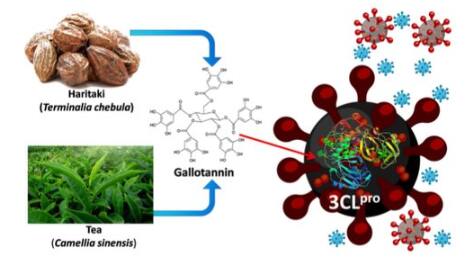Tea, haritaki extracts may act as therapeutic option against COVID-19, claims IIT-Delhi study
The experimental findings showed that aqueous extracts from Tea (scientific name-Camellia Sinensis) as well as Haritaki (Terminalia chebula) have potential anti-viral activity via in-vitro inhibition of the proteolytic activity of the main protease of the virus.
New Delhi: Amid ongoing global researches to find a therapeutic option against the COVID-19 disease which has emerged as a worldwide pandemic causing huge damage to the lives and economy of over 200 countries, a team of researchers at IIT-Delhi’s Kusuma School of Biological Sciences (KSBS) has claimed that aqueous extracts from tea (black and green tea) and haritaki (popularly known as harad in Hindi) have the potential to act against the coronavirus infection.
"There have been worldwide efforts for developing cost-effective therapeutic options, which can curb the severity of the viral disease in humans, with minimal toxicity. In this context, medicinal plants may provide a way to treat the disease by targeting specific essential proteins of the virus," said IIT Delhi's statement.
The team of researchers led by Prof Ashok Kumar Patel from the KSBS, IIT Delhi screened about 51 medicinal plants on 3CL protease (3-chymotrypsin-like protease) of the virus, which is necessary for processing the viral polyproteins and therefore has emerged as an interesting premise for the development of drugs targeting the virus. The team came to the conclusion that targeting of this protein would halt the replication of the virus.
The experimental findings showed that aqueous extracts from Tea (scientific name-Camellia Sinensis) as well as Haritaki (Terminalia chebula) have potential anti-viral activity via in-vitro inhibition of the proteolytic activity of the main protease of the virus.
"The findings (accepted for revision by a peer-reviewed journal) suggest the possibility of Gallotannin to emerge as a potential therapeutic candidate against SARS-CoV-2 in the future. However, larger randomized, double-blind, placebo-controlled multicentre clinical trials would be further needed," said Prof Ashok Kumar Patel.
"Indian herbal and medicinal plants have a vast repository of bioactive components useful in combating many disease. In this context, the beneficial effects of the tea in eliciting relief for COVID related conditions have been increasingly evidenced. The study carried out by Prof Patel and his group further revealed the effect of tea in inhibiting the nCoV protease, which will have significant implications once substantiated in vivo," said Dr SK Khare, Dean, R&D and Professor, Chemistry, IIT Delhi.
The research team led by Prof Patel includes Saurabh Upadhyay (PhD student), Praveen Kumar Tripathi (PhD student), Dr Siva Raghavendhar (Post Doc), Mohit Bharadwaj (Research Fellow) and Dr Manju Singh, who is an Ayurvedic physician at Morarji Desai National Institute of Yoga, New Delhi.
Stay informed on all the latest news, real-time breaking news updates, and follow all the important headlines in india news and world News on Zee News.
)

